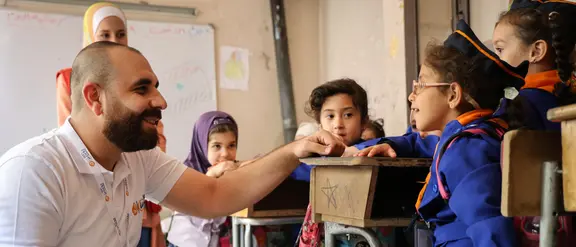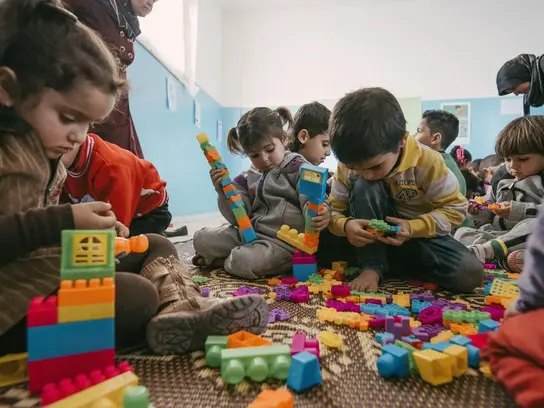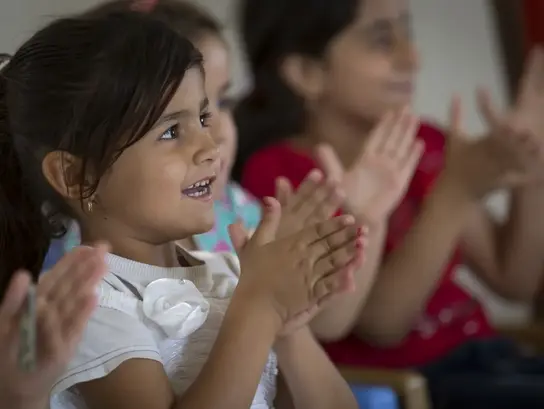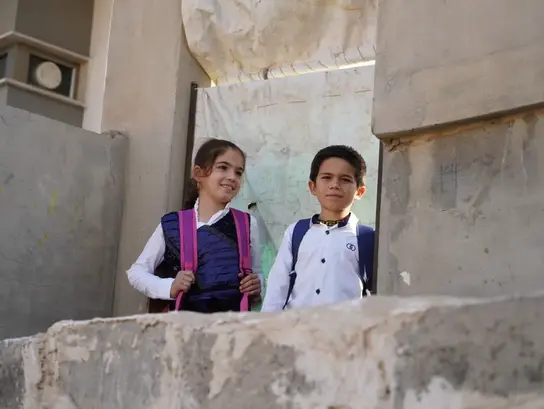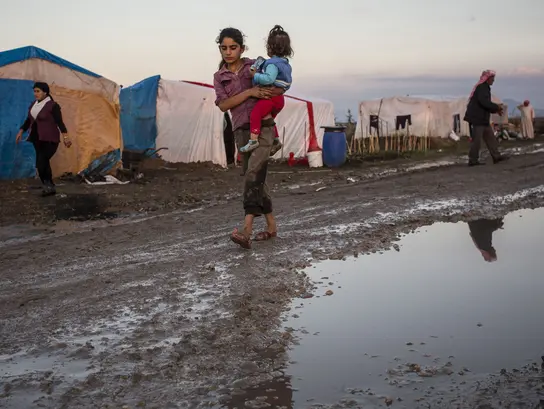Challenges after the fall of Assad
Syria experiences a historical turning point - but the challenges are overwhelming. After years of civil war, people take hope again. The fall of the Assad regime shaked up the country. Everywhere people cheer, families find each other again after a long separation, the torture prisons are opened. But with the joy of the end of the dictatorship, immense tasks also come.
The traces of the war are deep and the humanitarian situation in Syria is still challenging. The infrastructure and internal displacement of the population, which has been destroyed over the years, help to ensure that many people live in uncertainty and poverty. Children carry the heaviest load: they suffer from hunger, diseases and the loss of stability. Health services report high psychological stress.
Ethnic and religious minorities such as the Kurd: inside are particularly at risk. Due to attacks by Islamist militias and Turkish mercenaries, they were looking for refuge in the Kurdish autonomy areas in northeastern Syria over a hundred thousand of them. But here too the situation is tense. The resources are limited and there is a lack of basic relief goods in order to meet all refugees.
Help with a donation
Terre des Hommes has been supporting humanitarian aid in Syria for years. It urgently needs to be expanded:
Give children hope: access to food, education and psychological care to cope with the violence experienced.
Drive the reconstruction forward: Support in building schools, hospitals and community centers.
Shaping a future together: strengthening Syrian civil society and ensuring that everyone - regardless of ethnicity or religion - can live in peace and dignity.

"In order to secure the future of the country, a new government must be elected democratically, regardless of religion or origin."
Four months after Assad's fall, the situation in the country is still unstable. The group around Hayat Tahrir al-Sham (HTS) with transition president Ahmed al-Sharaa at the top is faced with the challenge of integrating all minorities in the country and enabling them with participation in the reconstruction. The surprising agreement between the Syrian central government and Kurdish self -administration in northeast Syria ensures new dynamics.
However, the hope of a peaceful and self -determined future is heavily shaken by the recent massacres in the Alawite minority. The sectarian violence endangers the country's stability, while external actors pursue geopolitical interests. In addition, Israeli attacks in the south and Turkish military operations in the north tighten the tensions and could trigger a new wave of flight. The initial euphoria increases increasingly uncertainty and fear. The violence of the past few weeks has left deep wounds and further burdened the fragile balance. And: The pressing question is how the severe human rights crimes of the past few years can be processed socially and legally.
Our partner organizations in neighboring countries report the diverse challenges and hopes of the Syrian exile. The fall of the Assad regime has created both opportunities and uncertainties for Syrians in exile. While some hope to return to their homeland, many are concerned about security, infrastructure and access to basic services in Syria.
Especially in Turkey, which houses the largest number of Syrian refugees, the political discourse on them has led to increased uncertainty. The economic crisis and increasing racism make the life of the Syrian refugees difficult. In countries like Lebanon there are increased pressure from the authorities and stricter residence regulations. In Jordan, school fees will be collected from the school year 2025/2026, which means that more refugee children cannot go to school.
The majority of Syrians in neighboring countries do not plan to return, mainly due to security concerns, lack of infrastructure and economic uncertainty in Syria. Simply back is not an option because there are great dangers. Families and children in particular show great back. Security risks, economic conditions and lack of guarantees against persecution influence the decisions of the refugees. Short visits to Syria are possible in Turkey, but associated with risks to refugee status. However, these visits are important to assess the location on site, but are risking the risk of losing protection status.
Ethnic and religious belonging and political affiliation make it difficult to return. Kurds and Alevis in particular are concerned about their security when returning. Some refugees, such as in Kurdistan, assume that they will never be able to return because of their ethnic or religious belonging. Events such as the prisoner clearances and the fate of the missing pollution burden the mental health of the refugees, especially children and families. In Lebanon and Jordan there is an urgent need for psychosocial support and trauma. The psychological stress is particularly high in survivors of torture and detention.
Since December 2024, according to Unicef and UNHCR, only a few thousand people have returned to Syria, while millions remain in exile in the neighboring countries. These figures illustrate the ongoing uncertainty and the great dangers that make a return impossible for many. This means in particular for children and families that they still have to live in a precarious situation without the safety and stability they urgently need.
The Syrians in exile have contributed significantly to society in the respective guest countries in recent years. It is crucial that they are not simply confronted with new uncertainties. Rather, it has to be developed together with them how things will proceed - be it in Syria or in exile. The international community is called up to strengthen their efforts in order to enable these people a safe and worthy future. Germany and the international community should be committed to protecting the rights of the refugees and enabling them more self -determination in the safe choice of their whereabouts.
How Terre des Hommes helps in neighboring countries
Lebanon: 1.5 million refugees from Syria
Around 90 percent of refugees live in poverty, and about 60 percent of Syrian children at school age do not attend school. In addition, many children are affected by child labor. The economic crisis, the unstable situation in Lebanon and the attacks of Israel further tighten the situation.
The Lebanese government has been trying to deport Syrians for a long time, although they often threaten them in Syria. Even if many Syrians return, the situation remains too insecure for the majority. Because of the dramatic situation, Lebanon has become a transit country for irregular migration to Europe - often the dangerous path across the sea remains due to a lack of legal escape routes.
The Cedar Center for Legal Studies (CCLS) is committed to the rights of Syrian refugees by offering them legal support and represents them before Lebanese courts. It is also committed to illegal deportations and documents human rights violations.
"For Syrians in exile, the current situation primarily means uncertainty, an increased risk of deportation and a deterioration in the social and economic conditions in the rating countries."
Iraq: 260,000 - 400,000 refugees from Syria
Many of the refugees come from the Kurdish areas of Syria. Many Syrian Kurds have found refuge, especially in the sub -autonomous Kurdistan region. Despite the relative security in some parts of Kurdistan, Syrian refugees, especially children, suffer from the persistently precarious living conditions. Poverty, restricted access to education and health services as well as the uncertain legal situation represent considerable challenges.
Green Desert (GD) is an Iraqi non -governmental organization based in Erbil, which is committed to mental health, child protection and gender equality. It offers psychosocial support, strengthens state protection structures and promotes reflection on masculinity ideas in communities in Mosul, Kirkuk and Erbil.
Jordan: 1.3 million refugees from Syria
Around 1.3 million Syrian refugees currently live in Jordan, which is about 20 percent of the country's total population. More than 80 percent of these refugees live below the poverty line and have little access to basic care, education and medical care. Many families are forced to accept debts for food or to work under precarious conditions. The economic situation of the country further exacerbates this situation. Children whose education and general well -being are significantly affected by the difficult living conditions are particularly affected.
The Soldiers Family Welfare Society (SFWS) supports children, adolescents and their families with psychosocial support, health care and educational offers in Zarqa. It also promotes income -like measures for women and strengthens the coexistence between the local population and refugee communities.
"People suffer from fear and trauma - because of what they have experienced in prisons or because they have been waiting for the release of close relatives who died there."
Türkiye: 3.6 million refugees from Syria
As many refugees currently live in Turkey as in hardly any other country - most of them come from Syria. Almost two thirds of children and adolescents do not attend school, which endangers their future. Many have to work to support their families - often under exploitial conditions. This leads to severe physical and mental stress. Girls are particularly disadvantaged: they are often married early or excluded from the school attendance.
The Asylum Seekers and Refugees Solidarity Association (ARSA) in Turkey supports refugee children with educational offers, empowerment programs and legal aid. She organizes online training, provides school materials, strengthens communities through training and is committed to safe and creative rooms for children.
"Many children have spent their whole life in exile and grew up in recording countries such as Turkey, where they integrated into the local communities."
8.4.2025
